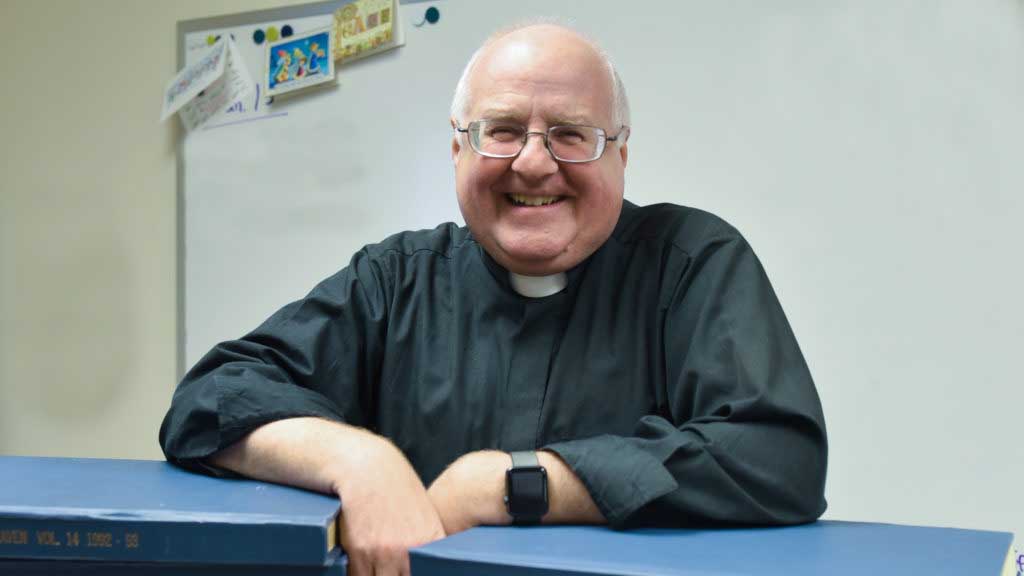
by Father Mark Goldasich
When will they ever learn?
This line from Pete Seeger’s song “Where Have All the Flowers Gone?” has been on my mind lately, especially after reading the articles on antisemitism, found on pages 7-9 of this issue. Some of it is difficult reading — not that it’s academically dense; rather, it makes us confront our history and our hearts.
Particularly on Good Friday, when we’ll hear from the Passion according to St. John, it’s vital that we understand clearly who the evangelist means when he says “the Jews.” The articles on antisemitism, written by freelancer Therese Horvat, will not only help with that, but also suggest ways to recognize and combat this scourge in our own day.
It’s easy to overlook our blind spots, as this story illustrates:
A man traveling in Northern Ireland asked a woman there, “How do you cope with the violence?” She answered, “It’s awful, but the danger is that we’re learning to live with it now. We’ve come to expect it. It’s a great sadness to us.” After a few moments, she added, “I will never be happy until every Catholic in Northern Ireland is dead.”
Later, the traveler concluded, “That saddened me beyond measure because this was a dear lady unfortunately abusing her mind. It is an abuse of the mind to want to kill Protestants or Catholics, or anybody or anything.” (Story found in Anthony Castle’s “A Treasury of Quips, Quotes & Anecdotes for Preachers and Teachers.)
I’ve witnessed firsthand some of that “abuse of mind” regarding Jewish people. Back in December 1977, I spent Christmas break in Munich. One day, I traveled 10 miles outside the city to Dachau, to the site of the first Nazi concentration camp. The weather that day was overcast and cold as I wandered the grounds, giving the place an air of foreboding, as if it still retained the memories of the horrors that occurred there. Over 200,000 people passed through Dachau at one time or another, and 41,500 died there, many disposed of in the crematoriums on-site. That camp haunts me to this day.
My second experience of antisemitism on a large scale came several years ago when I toured the U.S. Holocaust Memorial Museum in our nation’s capital. As I entered the museum, I was given a “passport” that contained the picture and story of a victim of the Holocaust. My eyes teared up often as I toured the exhibits: walking through a railroad car that transported people to the camps, seeing a mountain of shoes left behind by victims and reading stories of horrible abuse by camp officials. Knowing real people suffered these atrocities affected me deeply.
Although you may never travel to Dachau or Washington, there’s a prime opportunity to get an experiential look at the Holocaust right here in Kansas City, beginning in June. Union Station will host an exhibit of 700 artifacts and 400 photos, entitled “Auschwitz: Not Long Ago. Not Far Away.” It will no doubt be an uncomfortable but moving experience.
Sadly, in our country today, not only is antisemitism on the rise, but also abuses against many other minorities. The situation is not hopeless, however, if we use this story as a guide:
It was the first day at a newly integrated school in the South and tensions were high. When her first-grade daughter arrived home after school, a worried mother asked, “How did everything go, honey?”
“Mommy, you know what?” said the girl. “A little Black girl sat next to me!” The mother asked, “And what happened?” “We were both so scared,” answered the daughter, “that we held hands all day.” (Found in “Illustrations Unlimited,” edited by James S. Hewett.)
May we learn from the wisdom and courage of these little girls to set aside all prejudice and walk hand-in-hand into a future of mutual respect and support.


